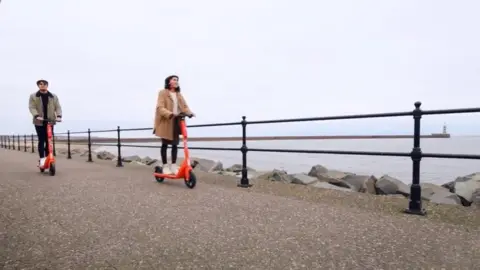Sunderland e-scooters trial encourages drivers to ditch cars
 Neuron Mobility
Neuron MobilityAn e-scooter trial in Sunderland has succeeded in convincing some drivers to ditch their cars, the city council has said.
In March, 300 of the electric-powered vehicles were made available to hire as part on an eight-month trial.
The council found 42% of riders said the scooters had encouraged them to use their cars less. However, there have been 45 complaints about their use including being driven dangerously.
The trial will now end in March 2022.
The bright-orange scooters, operated by Neuron, can only be used by adults who hold a full or provisional driving licence.
Deputy leader of the council Claire Rowntree said the extension was in line with allowing the government and Department for Transport to gather more information on how trials were working.
"The evidence gathered will guide final decisions about whether and, if so, how to fully legalise the use of e-scooters," she said.
"It is important that Sunderland continues to take part in the trial, as data collected will contribute to deciding the long-term vision of sustainable and active travel in the city and the UK."
She said that so far more than 42,000 trips had been made on the scooters, which had cut back on an estimated 12,000 car journeys.
A similar trial of e-scooters is also being conducted in Newcastle.
In March, six students were banned from the road for being over the legal alcohol limit while using the vehicles.
Neuron has since installed a "reaction test" on its app after 21:00 so users can determine if they are in a "fit state to ride".
Complaints about their use have also included people riding them two and a time, which is prohibited.

Follow BBC North East & Cumbria on Twitter, Facebook and Instagram. Send your story ideas to [email protected].
